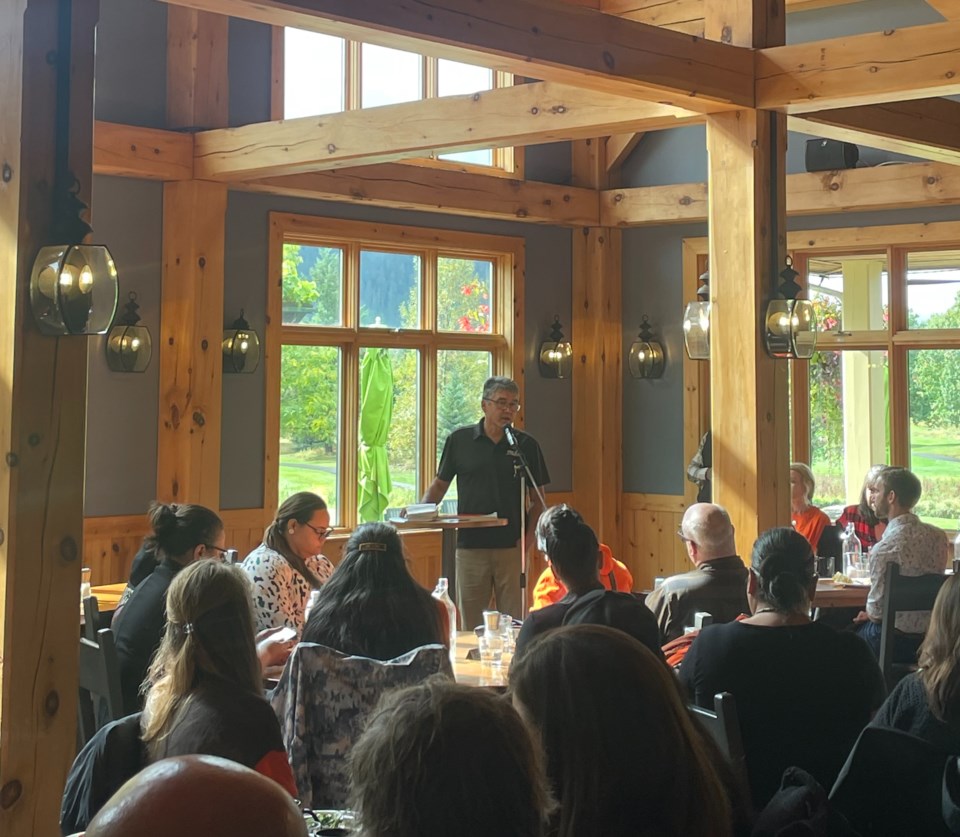The Pemberton and District Chamber of Commerce held a “lunch and learn” with Lil’wat Nation Political Chief Dean Nelson on Friday, Sept. 28, aimed at creating meaningful dialogue around what reconciliation really means.
Held at Big Sky Golf Club, the event was completely sold out, with chamber members eager to hear from Nelson and Lil’wat Business Group CEO Rosemary Stager. The event was timely, as on Sept. 12, the Village of Pemberton paused its Official Community Plan update to focus on a “deeper and more meaningful” relationship with the Lil’wat Nation.
Nelson told the packed crowd the word “reconciliation” should not just be an idea that pops up once a year.
“Reconciliation is a big word,” he said. “There has to be some concessions. If you look at Joffre Lakes, it’s just time and space that we are looking for. What we know cannot be unknown … We cannot have reconciliation with one group having power over another. Reconciliation is not just a word. It requires action.”
Nelson urged attendees to ask themselves what they can do to create positive change, suggesting simply reading the Indian Act would be a good start. The legislation was originally created to “assimilate” Indigenous people into mainstream Canadian life and values. It was first passed into law in 1876, and is still in effect today, with amendments.
“A relationship is inevitable, but what kind of relationship is it going to be?” asked Nelson.
In his remarks, the former teacher and firefighter tried to stress the true horror of Canada’s residential schools. He asked parents in the room to imagine their own children being taken away from them.
Nelson said a simple lunch could be the start of real change. “Our relationships must get better knowing what we know now,” he said. “It can’t be a one-day focus. It has to be a continuous process. We still have to live together, but what kind of relationship is that going to be? We are under the Indian Act, and that is just wrong. I look forward to positive change coming from this simple luncheon and food sharing.”
Stager explained how kids growing up in two neighbouring communities—like Pemberton and Mount Currie—can have two completely contrasting childhoods. She used her own mother and father as examples. Her mother grew up in Pemberton, while her father and his family were forced to live on a reserve on their own unceded territory.
Stager shot down the perception that Indigenous people get things for “free.”
“We do not get free homes, and yes, we do pay mortgages,” she said. “Our access to capital is much less than other communities. It’s not an exaggeration to say that my Lil’wat family was devastated by the impacts of colonialism. Instead of being raised in a loving home like my mom, my dad was forced to attend residential schools from the age of five.”
Stager said she only started to understand the atrocities her community faced when she reached adulthood, and had her own children.
“I learned about the roots of [my father’s] trauma while helping him with his residential school settlement paperwork,” she said. “It was heartbreaking and sickening to hear the daily compounded trauma that these children had to endure during their school years. Residential schools had a mission: to take the Indian out of the child.”
Stager said Canada’s Indian Act later became the blueprint for apartheid in South Africa. She explained how colonialism and greed ruined the Lil’wat’s traditional economy, one that is only now starting to recover.
“The people of Lil’wat Nation were traditionally business-minded before colonization,” she said. “The Crown amended the Indian Act in 1880 to actively exclude us from participating in the Canadian economy. Suddenly, costly permits were needed to carry out economic activities that we had taken part in for thousands of years. Commercial licenses were largely given to non-Indigenous operators while Indigenous people faced fines and prison terms.”
Permits were also needed just to buy food, clothing and other necessities.
“The message was clear—we do not belong here,” said Stager. “The Canadian economy had no place for us. While neighbouring Whistler and Pemberton prospered, Lil’wat continuously fell behind relying on inadequate government funding.”
But Stager stressed that positive change is now on its way, and the CEO revealed plans for a number of exciting commercial ventures the Nation is working on.
“We are in negotiations on new projects and in the planning stages for others,” she said. “We have a number of parcels of land in Whistler and Pemberton. We are contemplating appropriate development.”
Stay tuned to Pique in the weeks ahead for more on upcoming Lil’wat Nation projects.




